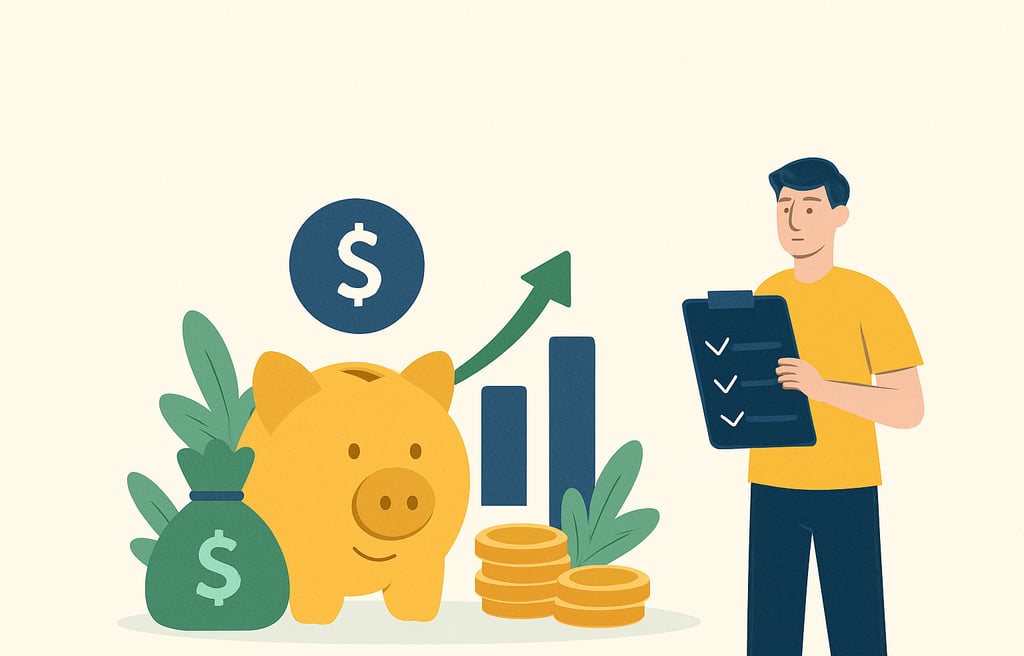💡 How to Build Healthy Financial Habits and Gain Peace of Mind with Your Money
Discover how to build healthy financial habits that bring peace of mind, reduce stress, and improve your money management. In this post, we explore practical tips like budgeting, tracking expenses, setting financial goals, and creating an emergency fund — everything you need to take control of your finances and secure your future.
8/6/20253 min read


Taking care of your finances is not just about saving money or getting rich — it’s about living with more security, freedom, and less anxiety. Developing healthy financial habits is one of the smartest ways to build a solid foundation for your present and future.
Whether you're struggling with debt, trying to save, or simply want to improve your relationship with money, these practical tips will help you start your journey toward better financial health.
1. Track Your Spending (Without Guilt)
Most people don’t know exactly where their money goes. That’s why the first habit to build is tracking every expense — no matter how small. Use a spreadsheet, mobile app, or even a simple notebook.
By reviewing your expenses at the end of the week or month, you’ll start to notice spending patterns: maybe you’re overspending on delivery, subscriptions you don’t use, or daily snacks. This insight gives you power — not to judge yourself, but to make informed decisions.
📌 Tip: Categorize your expenses (e.g., food, transportation, leisure, housing). This helps identify where adjustments can be made.
2. Set Clear, Measurable Financial Goals
Saving “for the future” is too vague to motivate most people. Instead, set specific and time-bound goals:
“I want to save $1,000 in 6 months for emergencies.”
“I want to pay off my credit card debt by December.”
“I want to save $3,000 for my vacation next year.”
Clear goals give you direction, and seeing progress helps build motivation. Write them down, review them often, and adjust if needed.
3. Create and Stick to a Monthly Budget
Budgeting doesn’t mean giving up everything fun. A realistic budget helps you prioritize what really matters while maintaining balance.
Start with these three categories:
Fixed expenses: rent, bills, transportation
Variable expenses: groceries, leisure, shopping
Financial goals: debt payments, savings, investments
Aim to follow the 50/30/20 rule if possible: 50% for needs, 30% for wants, 20% for savings or debt repayment. If your reality doesn’t fit this structure, that’s okay — adjust it to your lifestyle.
4. Avoid Impulse Spending with Simple Questions
Impulse purchases are often emotional. To resist them, build the habit of pausing before buying and ask:
“Do I really need this now?”
“Will I still want this next week?”
“Is this aligned with my financial goals?”
This moment of reflection can prevent waste and lead to smarter decisions — without depriving yourself.
5. Start Investing, Even with a Small Amount
You don’t need to be rich to invest. Start small — even $10 or $20 a month — and focus on consistency. Over time, compound interest will work in your favor.
If you're new to investing, look into:
Government bonds or fixed-income investments
Investment apps that allow small deposits
Educational content to understand the basics of risk and return
The important thing is to treat investing as a monthly habit, just like paying a bill or saving.
6. Build an Emergency Fund — Your Financial Shield
One of the most important habits is to create a financial safety net. Life is unpredictable — job loss, medical expenses, or unexpected repairs can happen at any time.
Set a goal to save at least 3 to 6 months of your essential expenses in a separate account. Start small if necessary, but be consistent. This fund will give you peace of mind and prevent debt in moments of crisis.
7. Educate Yourself Continuously
Financial education is a lifelong journey. Read books, follow finance blogs, watch videos, and talk to people who manage their money well. The more you understand, the more confident you become with your financial decisions.
Some good beginner-friendly topics to explore:
Compound interest
Inflation and purchasing power
Financial planning
Behavioral finance
✅ Conclusion: Small Habits, Big Results
Your relationship with money shapes your life. By adopting small but consistent financial habits, you build a future with more peace, stability, and freedom of choice.
You don’t need to be perfect — just intentional. Start today. Choose one habit from this list and commit to practicing it for the next 30 days. The results will surprise you.